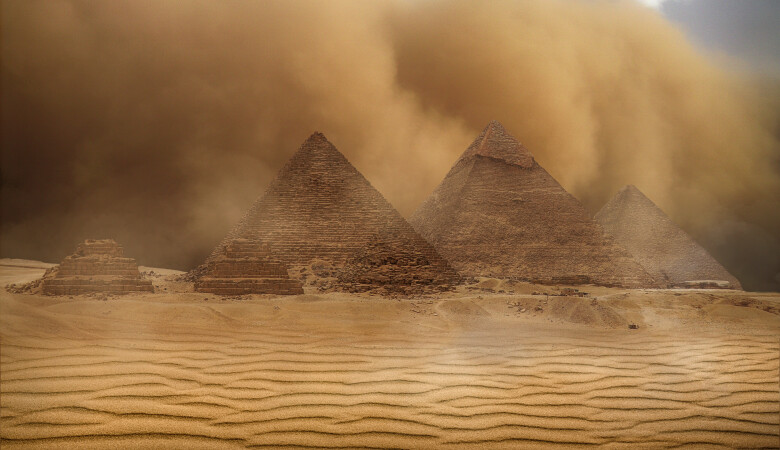The Eternal Kingdom of the Prince of Peace (Isaiah Sermon 8 of 80)
June 22, 2008 | Andy Davis
Isaiah 9:1-7
Incarnation, The Kingdom of Christ
Pastor Andy Davis preaches a verse by verse expository sermon on Isaiah 9:1-7. The main subject of the sermon is God's securing of His eternal kingdom through the coming Jesus Christ.
- SERMON TRANSCRIPT -
I. The Quest for Righteous Government
Well, I am really excited and joyful to be able to preach this passage to you this morning. This is a glorious section of scripture. It speaks of a great joy and people celebrating, of a sense of victory, coming through the victory of Jesus Christ. This passage speaks very plainly of Christ. And it speaks also of the government that he intends to bring. I think, in some way, the study of human history for thousands and thousands of years is the study of a fruitless quest of the human race for a righteous form of government and a righteous ruler to lead it.
It wasn't found in the ancient Egyptians for all of their achievements. You can still see the pyramids and the effects of the rule of the pharaohs over Upper and Lower Egypt. It wasn't found there. It wasn't found in the cruel Assyrians who swept in, who invented crucifixion, which took our Lord from this world. Just through their cruelty a pile of skulls was the measure of their success, the success of their kingdom. Certainly, it wasn't found in their cruelty. Nor was it found in the Babylonians, who through the genius of one man, Nebuchadnezzar, were able to build a glorious empire that lasted for just a short time and then sank back down into the dust. It wasn't found there. Nor was it found in the conquerors of the Babylonians, the Medo-Persians, who came along with their wide-reaching empire, or Alexander the Great who sought to take Greek culture and philosophy and literature and language and spread it all over the world. He had a vision for that trained by the philosophers. He never lost a battle, but he did not bring in a righteous form of government, as the history after Alexander certainly proved.
It certainly wasn't found in the Romans for all of their great achievements, for all of the tens of thousands of roads that they made, and all of their great structures for the Pax Romana, the Roman Peace, and that Roman system of justice, and their philosophers. They certainly did not bring in a righteous and lasting form of government in which we can rejoice. And after that darkness, the barbarian tribes swept in, hordes from the steppes of Asia who had no interest whatsoever in culture and just sought to destroy and to establish their own power for a short period of time. Nor was it found in Christendom, the kings, the feudal system, all of that. Things were only as good as the character of your king during that era. And that usually wasn't very good. And so they didn't find it in the kings and the nobles and the system of serfs and pages of the Middle Ages. It wasn't found there, in the divine right of kings.
Nor has it been found in representative democracy, a government of the people, by the people, and for the people which came in after the enlightenment. It wasn't found there. Every four years, we listen to the hopes of another political candidate and the utopian language of what it's going to be like if this or that individual or this or that party is elected into power. We Christians ought to know better. Winston Churchill put it this way in 1947 very famously, "Democracy is the worst form of government, except for all those other forms that have been tried from time to time." Typical of Churchill to put it so succinctly. It's basically the best we've been able to do. Certainly it is better than Communism, which had its run in the 20th century - enforced liberality to the poor, but really just a concentration of power in the hands of just a few. The same old thing, tyranny and corruption. It's the same always.
But the righteous king has been found. Amen? He's already walked our earth. Two thousand years ago, he came. He showed us what he was like. He displayed his character. And for two thousand years we've been getting a greater and greater sense of what kind of kingdom he is going to bring. And that kingdom is displayed so beautifully in the words of an ancient prophet who lived seven centuries before the king was born. And that's Isaiah. Look at verses six and seven, just to get a foretaste of the kind of government that Jesus will bring to us, in which we will live and rejoice for ever and ever. Put your hope here, friends, not in any political process. Put your hope right here. Listen to these words. "For to us a child is born, to us a son is given, and the government will be on his shoulders. And he will be called Wonderful Counselor, Mighty God, Everlasting Father, Prince of Peace. Of the increase of his government and peace there will be no end. He will reign on David's throne and over his kingdom, establishing and upholding it with justice and righteousness from that time on and forever. The zeal of the Lord Almighty will accomplish this." Amen and Amen.
That is the government we're looking forward to. That's what I'm looking forward to. I'm yearning for the government of the king of kings, of Jesus, to come and show us what righteousness really looks like here on earth, to establish and uphold it forever.
II. A Light in Darkness
The Cause of the Darkness and Gloom
Now, the context of this glorious gift - and it is a gift, “for … to us a son is given,” the Father is giving us this kind of a government, he is giving us this kind of a king - is great darkness, a people who walk in darkness. Any passage that begins with the word "nevertheless" causes you to look back a little bit. We are starting right in the middle of the story here, right in the flow of Isaiah's prophecy, and we are caused to look back to the end of chapter eight to find out the nature of this darkness and gloom into which this light shines. And it is the darkness of ignorance and of rebellion against the law of God. That is the darkness in which this light shines.
Look at it again. Verses 19 through 23 speak of consulting mediums and spiritists who whisper and mutter instead of consulting their God. Darkness and rebellion - they don't know God, they don't know his laws, they don't know his ways. They are ignorant, and they are rebellious. Even if they knew the laws of God, they would not follow them. And so this is a land of darkness. To make it even worse, these are the chosen people. These are the Jews, the people of God, the descendants of Abraham. These are the people who are walking in darkness, faulty spiritual guides who whisper and mutter - mediums and spiritists.
Friends, we have this problem too in our culture. Have you noticed the increased fascination with the occult in America? Have you noticed programs on TV like Ghost Whisperer and Medium that talk about connection with the dead? Always for a good cause, helping law enforcement officials to find the bad guy, this kind of thing. We are being duped. We're being sucked in. We struggle with the same thing, the same ignorance of the law of God, the same rebellion against those laws we do know. And Isaiah 8 says it very plainly. Isaiah asks a simple question and gives a clear command. “Why consult the dead on behalf of the living? To the law and to the testimony! If they do not speak according to this word [the word of God] they have no light of dawn" (Isaiah 8:19,20).
They are ignorant of the word of God, and the result is utter rebellion against God and eternal judgement as we talked about last time. Verses 22 and 23 of chapter 8, "Distressed and hungry, they will roam through the land; when they are famished, they will become enraged and, looking upward, will curse their king and their God. Then they will look toward the earth and see only distress and darkness and fearful gloom, and they will be thrust into utter darkness." Yet in the midst of this bleak picture, this gloom and this darkness, shines a ray of light so glorious and so brilliant. And his name is Jesus. He is the light of the world and he shines into this darkness. "Nevertheless," it says, verse one, “there will be no more gloom for those who are in distress.”
A Land in Darkness and Gloom Now Sees a Light
That land in darkness and gloom now sees a light. Now the context here, politically, is the humbling, it says, of the land of Zebulun and the land of Naphtali. This is referring, I believe, to the military oppression under the Assyrians. God was sending the Assyrians from the north, coming down from the north to invade the northern kingdom of Israel as a punishment for their sins. And during this time, during Isaiah's time, Assyria came. In 2 Kings 15:29, it says, “In the time of Pekah, king of Israel, Tiglath-Pileser king of Assyria came and took …Galilee, including all the land of Naphtali, and deported the people to Assyria.” So that is where it came first, that's the beginning of the exile, the beginning of the end of the people of God in the promised land. It is the beginning, I think, to what Jesus calls the times of the Gentiles, when the Gentiles will rule over portions of the promised land.
And so they deported... It begins with the land of Naphtali, the land of Zebulun, Galilee of the Gentiles. That's why it is called Galilee of the Gentiles, because the Assyrians come down, and not only do they deport the Jews out, but they bring pagans in to settle. This is what they did. They just rearranged peoples. And so the pagans came in there and they mingled with the residual people of God that were left there, the Jews that were left there, they mingled with them, they intermarried with them, and it became Galilee of the Gentiles. Idolatry and darkness from the ignorance of God and of his word. They were a people walking in darkness.
Psalm 119:105, "Your word is a lamp to my feet and a light for my path." That's the light that God has given us, that we walk not in darkness but have everlasting light. But I tell you this, physical slavery and oppression, even under the Assyrians, is nothing compared to the cruel bondage that we feel under sin. That is the true task master. And I believe behind the political language and the military language of Isaiah 9, is the spiritual language of the release that Jesus has brought us, the release from sin and death, my friends. In John 8:34, Jesus said, "I tell you the truth, everyone who sins is a slave to sin." Romans 5:21 says, "…just as sin reigned in death." Now, there is a tyranny for you, sin reigning in death. It is vicious and cruel. So Galilee of the Gentiles was humbled by their military domination, by their ignorance of God and by their slavery of sin.
That's the past though. In the past. Oh but, “In the future,” he says, "he will honor Galilee of the Gentiles, by the way of the sea, along the Jordan.” (Isaiah 9:1). How is he going to honor? The word literally means to glorify. He will raise them up out of the darkness and he will honor them and he will glorify them. Now what great honor can come to a land so downtrodden? What can these words mean?
“Can anything good come from Nazareth?”
Or shall I put it in the language of the New Testament? “Can anything good come out of Nazareth? Can anything good come from the northern regions where the Gentiles were?” That was Nathaniel's statement when he heard about a messiah, the son of God who was coming from Nazareth and Galilee. “Can anything good come from that place? That's the place of judgment, the place of darkness.” Oh, yes, something gloriously good can come from there.
Jesus can come, and there is a clear prophecy here in Isaiah 9, that the Messiah would come from Galilee of the Gentiles. “The people walking in darkness have seen a great light; on those living in the land of the shadow of death a light has dawned” (Isaiah 9:2). And his name is Jesus. This prophecy had been forgotten. Even those that studied the scriptures diligently did not remember. I'm speaking of the Sanhedrin. They spent their whole time studying the scriptures, at least some of them did. And you remember Nicodemus, how in John chapter 7 he stuck up for Jesus and said, “Can we at least give him a trial before we condemn him?” And so he gets a faceful of lead just for saying that. John 7:52, “Are you from Galilee too?” That's an insult by the way. To us it's not much of an insult, but that was an insult there. “Are you from Galilee too? Is that where you come from Nicodemus? Look into it and you will find that a prophet does not come out of Galilee.” Well, they should have looked into it. You can imagine Jesus saying, “Have you not read in Isaiah nine, 'The people walking in darkness have seen a great light’?” They've come walking in darkness and Jesus shines in Galilee of the Gentiles. Here he comes.
Deeper symbol: life without Christ
It's a deeper symbol though. It is the life that all of us faced apart from Christ before we were converted. And let me tell you something, you are surrounded every day by people who are walking in darkness, who live in the land of the shadow of death, an eternal death, the second death, the death in the lake of fire, that hangs over people you live with every day. They are walking in darkness. They are dead while they live, because they are following “the ways of this world and of the ruler of the kingdom of the air, the spirit who is now at work in those who are disobedient” (Ephesians 2:2). They are under the power of death. They walk in darkness every day. They need the light that we can bear, the light of the gospel of Jesus Christ. That's what they need.
It says in 1 John 2:11, "Whoever hates his brother is in the darkness and walks around in the darkness; he does not know where he is going, because the darkness has blinded him." And only Jesus himself can bring light into that darkness. Jesus said in John 8:12, "I am the light of the world. Whoever follows me will never walk in darkness, but will have the light of life." I think many of you who are listening to me today can testify to that truth, Amen? Amen. You have found Jesus to be light in a dark place once for all in the salvation of your souls. And day after day after day he shines his light to you and teaches you the way to go. He is the light of the world.
Result of Light: Great Joy (vs. 3)
Now what is the result of that light, the shining of that light? Look at verse three: great joy. Verse three, "You have enlarged the nation and increased their joy; they rejoice before you as people rejoice at the harvest, as men rejoice when dividing the plunder." Sin's darkness, and the depression that comes from it squelches all joy. It just crushes it. And so people put on a happy face. They celebrate things that don't really matter. They don't have any sense of lasting happiness and joy because they haven't found Jesus. They don't know what it is like to be a branch on that living vine and to have the renewing power of joy day after day. Not a joy that comes from you or that comes from your circumstances but that comes from the truth of this word, that Jesus has crushed death forever and will never be under its dominion again. They don't know it.
The Westminster Shorter Catechism asks, “What is the chief end of man?” And you know the answer. The chief end of man is to glorify God and enjoy him forever. You were destined for eternal joy in Christ, you who are believers. That's what you were made for. You were crafted for joy and you haven't touched one millionth part of it yet. The greatest joy is yet to come. That is what he made you for. The joy of knowing God, of knowing his son Jesus Christ.
III. The Source of Joy: “The Day of Midian’s Defeat” (vs. 3-5)
A Military Victory [Need to know OT history for this one!!]
Now the source of this joy is a victory likened to a great military victory: “the day of Midian's defeat” (verse 4). What is that referring to? Well, you have to know Old Testament history for this one. Look at verses four and five. "For as in the day of Midian's defeat, you have shattered the yoke that burdens them, the bar across their shoulders, the rod of their oppressor. Every warrior's boot used in battle and every garment rolled in blood will be destined for burning, will be fuel for the fire." Oh, what a great celebration! What great joy it's referring to.
Some of you may be old enough to remember the celebration at the end of World War II - VE Day and VJ Day. The rest of us who are younger have read about it. We have seen it in documentaries. There was wild, crazy dancing in the streets. The Nazis were not going to rule the world after all. VE day, May of 1945, the world is released from that bondage. Hitler is dead. The Nazi regime is crushed. It's over. But even then, tempered by the fact that there was still a war going on in the Pacific, still ultimate victory hadn't been won. But then in August came VJ Day and it was all over. World War II was over, and there would be none of that oppression and none of that bondage.
The story of Gideon and the Midianites
Well, like that joy and celebration, so it is with this victory that is the foundation of our eternal joy. "As in the day of Midian's defeat." Now what is this referring to? Well, this is coming right out of the book of Judges. You know that book, a strange book in the Old Testament, testifying to the wickedness of the hearts of God's chosen people, to the sinfulness of the Jews, how they continually violated God's law or didn't know it. The Levites weren't teaching it. And so there was a constant cycle in that book of rebellion and sin. And God would judge them by giving them over to some Gentile enemy. The Gentile enemy would rule for a while, and God would raise up a deliverer, and he would effect some military victory, and then the people for one generation would kind of walk with the Lord. And then in the second and third generations, it would devolve again, slide back down into rebellion and it would start all over again.
In the summary verse at the very end in Judges it says, “In those days Israel had no king; everyone did as he saw fit” (Judges 21:25). I'm telling you, all of history can be summed up in this: the search for a righteous government and a king to lead it. And they didn't know the king, so they rebelled again and again. And so in Judges 6, we learn about Midian. It was Midian's turn to dominate the people of God. It says, “Again the Israelites did evil in the eyes of the LORD, and for seven years he gave them into the hands of the Midianites. Because the power of Midian was so oppressive, the Israelites prepared shelters for themselves in mountain clefts, caves, and strongholds” (Judges 6:1,2). They are living in caves, not in their fertile fields, in the houses they did not build and the vineyards they did not plant. They were done with that. They were banished into caves and clefts, strongholds. Whenever the Israelites planted their crops, the Midianites invaded their country like locusts and destroyed all that they had planted.
Ultimately, they cried out to the Lord for help, and he heard their cry. And so he raised up a deliverer, Gideon. And the angel of the Lord finds Gideon threshing in a wine press. Not a good place. You want to be up on a kind of bare spot where the wind sweeps across. He is down in a sunken area trying to hide his grain from the Midianites. It’s not a good threshing area, but what can you do when you are under the boot of the oppressor? And so there is Gideon, and he is just toiling away. And the angel of the Lord comes and calls him to this role of being deliverer. And he chose from the smallest clan, the weakest family in that small tribe, this deliverer Gideon. He is doing it on purpose. And why? Because God's method in this deliverance is self-exaltation. He is going to deliver the people in such a way that he gets all the glory. He is going to do it through weakness. He is going to do it through frailty and he is going to do it by the enemy imploding on itself and using their own weapons to destroy themselves. That sounds like what Jesus did, as in the day of Midian's defeat.
Well, you know the story of how Gideon got the army together. He had to have some help for his weak spirit. So he puts out the fleece once and then he puts the fleece out again and God stoops to his weakness and lifts him up. And then he has a dream. He overhears in the Midian camp about some barley loaf that rolls down. What a strange dream. But he gets inspired by the rolling barley loaf. It's quite a story. It really is. A picture of weakness and frailty. This is no great military leader. And then he gets the army together and he says, "You've got too many men. Send them home." No general has ever done that. They are always looking for more recruits. He sends them home, he sends them home, he sends them home, until at last, he's got 300 men. Ah, the choicest of the brave, right? I don't think so. You've missed the point if that's what you think. They are not going to make a movie about that 300. Not at all. These are weak people who don't even bring a weapon to battle. They just stand around the Midian camp with torches and trumpets. And at the signal, they break their lanterns and the torches come ablaze, and the trumpet sounds, and the enemy turns in on itself and just destroys itself until they are dead.
To God alone be the glory for that one. To God alone be the glory. And that's the whole point, isn't it? Isaiah is making an analogy here. As in the day of Midian's defeat, so also will be this victory through Jesus Christ. And so he raises up a little baby (more about that in just a moment), a picture of weakness, a picture of frailty. But Jesus in the manger is nowhere near as weak as Jesus up on the cross, seemingly helpless, bleeding and dying, by his frailty, by his weakness, by his death on the cross, destroying the boot of the oppressor, Satan, destroying the lash of the tyrant, sin, just by dying. As in the day of Midian's defeat. We know what we're talking about here. Everyone who sins is a slave to sin. That is the lash of the oppressor. “The wages of sin is death” (Romans 6:23). That is the boot of the tyrant. We can't throw it off. It is too strong for us. We can't defeat death. We need a deliverer. We need deliverance, and deliverance will come. Hebrews 2:14,15 says, “Since the children have flesh and blood, he too shared in their humanity so that by his death he might destroy him who holds the power of death - that is, the devil.” By dying, he destroys the devil. By dying, he destroys the devil and frees those who, all their lives, were held in slavery by their fear of death.
So what does he do? Well, he turns the devil's weapon back on himself. The devil's got in his hand the power of death. Not anymore. Jesus has it now. “I hold the keys of death and Hades,” he says (Revelation 1:18). He won them. How? By dying. And so Satan kills Jesus, and in so doing, in that way, he destroys himself. You've heard of one of David's mighty men who killed this powerful man by snatching the spear from him and killing him with his own spear. That's what Jesus does with Satan. Habakkuk 3:13,14 says, “You crushed the leader of the land of wickedness, you stripped him from head to foot. With his own spear you pierced his head.” Satan made a bad mistake in killing Jesus, didn't he? He didn't know what to do. He did not know what to do and so he killed Jesus, because that is what he did. He is a murderer. He is a liar. He followed his own nature and in so doing he killed himself, as in the day of Midian's defeat.
IV. The Surprising Conqueror (vs. 6)
Who will be this conqueror? A child!!
But look at the conqueror in verse six. Who is this surprising mighty conqueror? Well, it's a child. "For to us a child is born, to us a son is given, and the government will be on his shoulders." Here is a surprising connection - a military victory in verses two through five, and a child introduced in verse six. Similar to Isaiah 7:14, "The virgin will be with child and will give birth to a son, and will call him Emmanuel [which means ‘God with us’].” The message is this, that domination and oppression is conquered by vulnerability and weakness and submission to the will of God. It is conquered by a little baby. But this child is no ordinary child. Not at all. There is a mingling here of the natural and the supernatural, even in the titles of Jesus. It doesn't come across so well in the English, but it is very strong in the Hebrew. There is a clear mingling. There is an incarnation here. A child is born that is human, but he is called Mighty God. Now that is divine. So we have a mingling. We have the incarnation right here in these verses, that “the Word became flesh and made his dwelling among us" (John 1:14). That word, who is God, made his dwelling among us.
Natural Yet Supernatural… Isaiah’s Four Titles:
Look at these titles. We have a divine aspect and human aspect:
- Look at the first one: “wonderful counselor.” Let me shift it a bit, “miracle counselor.” How about that one? Because that is a valid translation. A counselor who does miracles, who has supernatural power then.
- The second one: “Mighty God.” The word is “el gibbor.” “Gibbor” just means a warrior, but the word “el”, now that means God. We’ll talk more about all of these in a moment, but I am just going across and showing you the mingling of the titles.
- “Everlasting Father.” Now all of us have a father. But there is only one eternal Father, one everlasting Father. You see the mingling of the human and the divine.
- And then the “Prince of Peace.” The word 'prince' is just an ordinary government official, a word that is used many, many times. But this word 'peace' - the more you study it, the more you realize only God can give that. Shalom. True peace. There is a mingling here of the divine and the human.
So we first have a miracle counselor, a counselor who is going to work miracles. He gives good advice, you ought to follow it. By the way, is there any difference between Jesus' advice and his commands? I think not. Any difference between his commands and his promises for us as Christians? I think not. It's all the same. He intends to do us good. Whatever he commands is a promise he's going to work in us, and also his advice. He is the wonderful counselor. He gives wonderful advice. “My sheep listen to my voice… and they follow me” (John 10:27). But he does miracles, signs and wonders.
Secondly, Mighty God, El Gibbor. Now, a warrior is what we need to win a victory. Jesus is a warrior. There has never been one any more powerful. If you want to read about a military victory unlike any there has ever been in history (it just hasn't happened yet) read Revelation 19, when Jesus comes back before the armies of heaven and everyone dies by the sword coming out of Jesus' mouth. That's the kind of warrior he is. Oh, he is a dreadful enemy but a marvelous savior! But the first one, El Gibbor, Mighty God. Now that is a word reserved in Isaiah's prophecy only for Almighty God. Isaiah 44:6 - “This is what the Lord says - Israel's King and Redeemer, the Lord Almighty: I am the first and I am the last. [Listen to this!] Apart from me there is no God.” Same word, El. There is no God apart from me. Isaiah 44:8 - “You are my witnesses. Is there any God besides me? No, there is no other Rock; I know not one.” He is saying there is no other God. Why is he saying this to Israel? Because they were syncretistic. They were mixing religions together. Yahweh, yes, but so also Baal and Ashtoreth and all the others. He is saying, "No! There are no other Gods."
In effect, he is saying, "I have studied my universe. I made it. I know. I've looked top to bottom, front to back, left to right, north, south, east and west. There is no other God. I know not one." Isaiah 45:5 - “I am the Lord and there is no other; apart from me there is no God.” Isaiah 45:21,22 - “And there is no God apart from me, a righteous God and a Savior; there is none but me. [Do you get it? It is very, very plain.] Turn to me and be saved, all you ends of the earth; for I am God and there is no other.” Oh, this is a title reserved in the book of Isaiah only for Almighty God, the creator of the ends of the earth. And yet it is ascribed to the child that's born. He will be called Mighty God, the deity of Christ established plainly.
And then Eternal Father. Father, of course, implies an intimate caring relationship to his people. Isaiah 40:11 - "He tends his flock like a shepherd: He gathers the lambs in his arms and carries them close to his heart; he gently leads those that have young.” He is the good shepherd. He is a tender father, as a father should be. Caring for us, yes, but that word everlasting, now that's eternal. Eternal Father. Micah 5:2 says, "But you, Bethlehem Ephrathah, though you are small among the clans of Judah, out of you will come for me one who will be ruler over Israel," listen to this, "Whose origins are from of old, from the days of eternity" (NASB). The one born in Bethlehem is coming from eternity past to enter into time. He steps into time at Bethlehem, but he is of eternal origins. And he says so during his trial before Pontius Pilate. Pilate says, "So you're a king?" Jesus always told the truth, “You are right in saying I am a king. In fact, for this reason I was born, and for this I came into the world, to testify to the truth. Everyone on the side of truth listens to me” (John 18:37). That is eternity speaking there, friends. That is eternity speaking. Not one of us who draws breath today chose to enter this world. None of us. There was a stab of blinding light to your up-to-that-moment blind eyes, and there was some pain, and there was air in your lungs, and you were alive. And it's been interesting ever since. But you didn't make any choice there, not at all. But Jesus did. He chose to take on a human body. He is the Everlasting Father.
And he is the Prince of Peace. Prince is a natural word in Isaiah, like this for example, “Your rulers (same Hebrew word) are rebels, companions of thieves” (Isaiah 1:23). How does that sound? Or this one, speaking of Egypt's rulers: “The officials of Zoan are nothing but fools” (Isaiah 19:11). So that's what we get. Those are our princes - companions of thieves and fools. That is not good when government is run by companions of thieves and fools. But Jesus is not that way. He is a prince yes, but he is the Prince of Peace. He is a prince who brings eternal peace, divine peace. You've already heard this in Isaiah 2:4 - “He will judge between the nations and settle disputes for many peoples. They will beat their swords into plowshares and their spears into pruning hooks. Nation will not take up sword against nation, nor will they train for war anymore.” The peace that Jesus brings is an eternal peace. It is a peace that goes up vertically with God and a peace that extends horizontally with all people.
And it was testified to by the angel who announced his birth. Luke 2:14, "Glory to God in the highest, and on earth peace to men on whom his favor rests." That peace. Or this one, John 14:27, “Peace I leave with you, my peace I give you. I do not give to you as the world gives. Do not let your hearts be troubled and do be afraid.” That's the peace that he comes to bring. Do you know that peace today? Do you understand the peace that only Jesus can give, a peace that Philippians says “transcends all understanding” (Philippians 4:7), a peace that settles into your heart and navigates you through whatever God chooses providentially to bring in your life? Do you know that peace? Jesus is the prince, the king of that peace. And ultimately that peace is with God. That is the basis of all the other experiences of peaceful feelings that we have. Romans 5:1 says, "Therefore, since we have been justified through faith…” (what do we have?) "…we have peace with God through our Lord Jesus Christ.” That's the nature of our king. He is the Wonderful Counselor. He is the Mighty God. He is the Everlasting Father. And he is the Prince of Peace. That is what he is like.
V. The Kingdom of Christ (vs. 7-9)
The Identity of the King: Jesus Christ
What is his kingdom like? Well, that's what we are talking about. In verse six, it says, "The government will be on his shoulders." Can we write him in in the presidential election this year? Can we do that? I don't know that it will get us far. He has his own timetable. In John 6, they tried to take him by force and make him king. I think if he got elected, he would not serve at this present time, unless that was his purpose. But he is the king. And the government is going to rest on his shoulders, because he is fit for it. God chose him for this role. The Wonderful Counselor and Mighty God is a perfect blend of wisdom and power, and that's what we need, don't we? We need a king who is wise and a king who is powerful. Now a king who is powerful and not wise, that's called a tyrant. We've seen plenty of those. A king who is very wise but doesn't have power, I think that's a philosopher. That's really not a king. We need somebody who is going to be wise and powerful, and that is Jesus. He is the one on whom the government is going to rest.
The Wealth of His Kingdom: Increase and Peace
Now, look at the nature of his kingdom. It says, “Of the increase of his government and peace there will be no end” (Isaiah 9:7). His kingdom is characterized by increase. It's going to get bigger and bigger, and grander, and more and more glorious. For how long? Well, forever. Now hang on to that thought because that will blow the circuits in your brain. I am going to try to blow them in a minute. But I just want to talk about the increase of his kingdom from the time he entered until now. There has been an increase in this world as more and more people from every tribe and language and people and nation have been hearing the gospel of Jesus Christ, have repented of their sins, have trusted in him and have found forgiveness. And I prayed this morning and I will pray again, that somebody who is listening to me today, who is in darkness because they have never received Jesus as their Lord and savior, will today receive forgiveness through faith in his name.
If you are a believer in Christ, pray for that person right now, that they would repent and that they would look to Jesus, that they would turn to Christ and be saved. And guess what? His kingdom will increase a little bit more. As another person gets saved, another person repents and believes in Jesus. Oh, trust in him! And so the kingdom just keeps on increasing until there is a multitude greater than anyone could count, from every tribe and language and people and nation, standing around the throne, dressed in white robes and saying, “Salvation belongs to our God, who sits on the throne” (Revelation 7:10). Until that happens the kingdom is just going to keep on increasing. But it is going to be a secret increase. It is going to be a hidden increase. For the kingdom of heaven is “like yeast that a woman took and mixed into a large amount of flour until it worked all through the dough” (Matthew 13:33, Luke 13:21). It just keeps permeating, and nobody really notices except Christians who care about unreached people groups, and who are evangelizing their neighbors, and praying for this very thing as we look forward to the day of God and speed its coming. We want his kingdom to increase. We are yearning for it. It is going to keep on growing. That is increase now in history.
It also increases every time you learn something new as a Christian. Every time you learn something new about God and about Christ, his kingdom gets a little bit greater. “[Oh] glorify the Lord with me; let us exalt his name together” (Psalm 34:3). Let's make Christ greater. Let's speak scripture to each other. Let's think great thoughts of Jesus and expand each other's love for Christ, and his kingdom will keep on increasing.
Yes, but that just takes us to the end of time. That's not enough for Jesus. That just takes us to the end of history. Is his kingdom going to increase after he has established the eternal kingdom? Will it keep on increasing there? Well, it says, “Of the increase of his government and peace there will be…” What? "No end."
Well, this is where I started meditating. I said, "Well now, listen. Is it going to keep on getting greater and greater up there in heaven, in the new heaven and new earth?" For the longest time, I had a very static view of heaven. I've talked about this before, but it really characterized me for most of my first twenty years of being a Christian. You died. You saw Christ. You were transformed. 1 John 3:2 - "We shall see him as he is." And we're just transformed. We're made holy. Resurrection happens, we're conformed to him, and we get, in the modern 21st century language, an instant download. It's not that zero to one hundred percent kind of thing, the slow thing like with the old landlines. No, it is going to be “boom!” One hundred percent. You get instant knowledge. You will know him as fully as he has known you. And then forever you will rejoice in that instant knowledge you received. And we will all be kind of around the throne, learning nothing, mind you, but just celebrating forever these things we have come perfectly to know. Kind of like a picture that never moves - a perfect picture, but it just never moves.
That is not where we are are headed. That is not where we are going. “Of the increase of his government … there will be no end." Well, how does that work? At the resurrection, they will neither marry nor be given to marriage. No babies as far as I can tell. No new people. No need for evangelism. They're all there. The elect have all been saved. There is nothing left of that. How then will this kingdom keep on increasing? Well, you are going to start to get to know some incredible people up there in heaven. Let's start there.
Let's say, for example, you sit down up there in heaven, and you talk to a Nestorian Christian, who took the gospel to China in 635 AD. Talk to him about his life. Let him share with you his testimony, how he shared the gospel there in the Tang Dynasty in China, and how he won Chinese to faith in Christ in that era of history. But imagine a three-way conversation. Jesus is sitting with the two of you, and he is filling in the spiritual details of what he did through angels, and by his power, and through the Holy Spirit to make all that happen. And Nestorian Christian’s mind is getting blown, and yours is too, and Jesus is downloading more and more, and you find out just from that one individual what God did through that person.
Or maybe a Japanese martyr who died in 1597 during the shogunate of Hideyoshi, and they would not yield and they died hideously for their faith, 1597. And again, imagine a three-way conversation, and you and that Japanese martyr are learning from Jesus all that he did to sustain that person right through the martyrdom. And then Jesus is filling in what he did (because the blood of the martyrs is seed for the church), and how he took it from there and just caused the gospel to advance. And that's just two people you have talked to.
And meanwhile, you're gazing at the throne. You are focused on God. You are learning more about his glory and his power. There is a new earth to be explored. It is radiant and perfect. And “the earth will be filled with the knowledge of the glory of the Lord, as the waters cover the sea” (Habakkuk 2:14). You are going to be learning forever. But the great thing is, you are never going to forget anything you've learned. You're just going to keep on learning and learning and “of the increase of his government and peace there will be no end.” Forever and ever, we will be there. I can't wait. I'd like to go there today. But in the meantime, there is still some work to be done, isn't there? There are still some things to be done.
The Nature of His Kingdom: Prophetic, Secure, Holy, Eternal
David's throne - Jesus will reign there. It is a prophetic kingdom. It is predicted that he will reign on, but it's not finished yet. All the elect haven't been saved. Not every tribe and language and people and nation have heard the gospel yet. He is going to establish and uphold it forever. It is a secure kingdom. There is no sliding back with Jesus' kingdom. It always keeps growing. But there is work to be done. It is a holy kingdom of justice and righteousness. But there are still things we need to do. We have a role to play. And what is our power source? It says it right there, "The zeal of the Lord Almighty will accomplish this" (Isaiah 9:7). Amen and Amen. A picture of it is the sun. Fusion. Burning and burning and burning and never decreasing. Just burning with the zeal of God Almighty for his only begotten Son. "Sit at my right hand," he has said, "until I make your enemies a footstool for your feet” (Psalm 110:1). Oh, we need fear nothing except failing the Lord in this hour of need. This is the time for us to step forward. This is the time for us to advance the kingdom to some people who don't know him at all, who are still walking in darkness. We have a labor to do.































